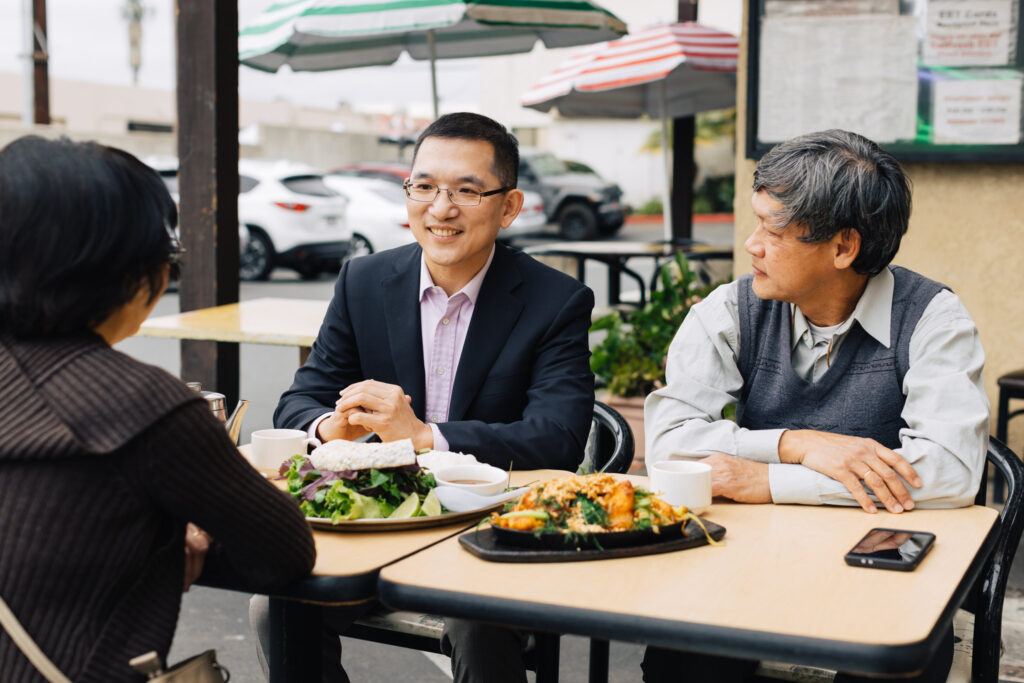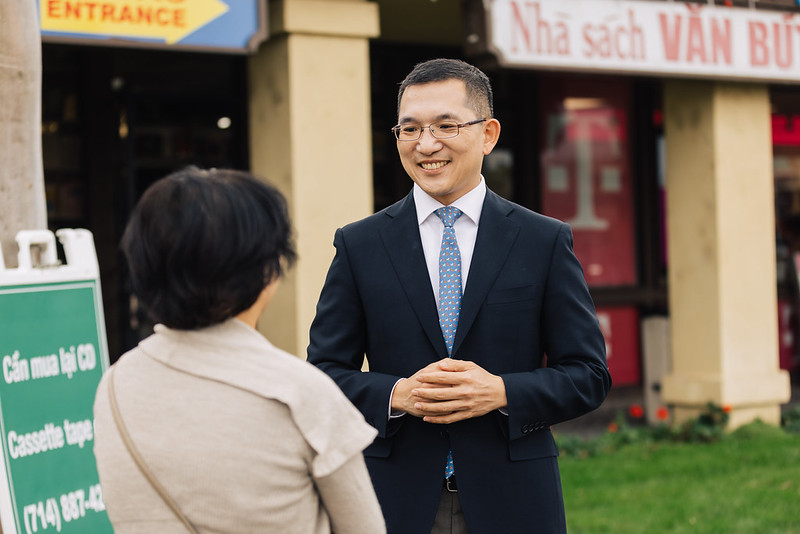by Akemi Tamanaha, AsAmNews Associate Editor
In Orange County, California, an area known for its conservative political beliefs, one Democrat is hoping to flip a House of Representatives seat from red to blue.
Lieutenant Commander Jay Chen (D) is challenging Rep Michelle Steel (R) for the House seat representing California’s 45th Congressional district. A win in the 45th district could be monumental in helping the Democrats keep control of the House.
Chen spoke with AsAmNews about how his life has shaped his political aspirations and how he plans to help the people living in District 45 if elected.
Early life in the Midwest
The 44-year-old Democratic hopeful was born in Kalamazoo, Michigan to two Taiwanese immigrants.
Chen’s parents made sure their children were raised to appreciate their Taiwanese culture. The first language they taught their children was Mandarin, a practice that Chen has since implemented with his own children. Chen said his mother would also play the Chinese harp at community events.
“They really tried to promote their culture at all the neighborhoods we lived in,” Chen said… “but they felt like it would be better for us if we grew up around folks who looked like us and who shared the same background.”
Chen’s father came to America on a scholarship to study at the University of Pennsylvania. His older brother was born in Philadelphia.
After graduation, Chen’s family moved wherever his father, who was aiming to launch a successful corporate career, could get the best job possible. Most of those jobs were in the Midwest. Chen lived in Michigan, Ohio, Indiana and Oregon. He and his family were often the only Asian people in the community.

Understanding the importance of Asian American representation
The family left Oregon when Chen’s father took a job in Singapore, where they lived for four years. There Chen was surrounded by Asian faces, unlike in the Midwest.
“I think that was a good way to grow up because, on television, everyone I saw around me was Asian,” he said. “All of the movie stars all of the politicians. So for me, it was not out of the ordinary for Asian faces to be involved in politics or to be represented well.”
In 1988, the family moved to Hacienda Heights, a suburb of Los Angeles, California. Chen said he was more cognizant of the lack of Asian American representation after living in Singapore. In Hacienda Heights, he lived around plenty of Asian Americans but saw few Asian Americans on television and in politics.
Chen also discovered his father, despite his prestigious degree had hit a “bamboo ceiling” in corporate America. He decided to start his own import-export business in Hacienda Heights.
“That’s been the story for a lot of immigrants…” he said. “Many have advanced degrees but they find that that’s their best way to get ahead because they’re not finding that they’re making it in the traditional corporate structure.”
An influential visit from Al Gore
The Hsi Lai Temple opened in Hacienda Heights the same year Chen’s family moved to the area. It was the first overseas temple for Fo Guang Shan, a Buddhist organization from Taiwan. At the time, Chen said the temple’s construction was controversial.
“People were saying there would be gongs banging at night, that there would be animal sacrifices,” he said. “Just completely ludicrous allegations with very xenophobic undertones.”
In 1996, when Chen was the news editor for his high school paper, Vice President Al Gore came to visit the temple.
“This was a big moment for the Asian American community because we had been pretty much ignored up until that point,” Chen said. “We just weren’t factored in, but now that the big political players were paying attention to us.”
But the visit was soon marred by a campaign finance controversy. The United States Justice Department accused a Taiwanese American of collecting donations for the Clinton-Gore campaign and reimbursing it later with temple money.
“People who had Asian last names who contributed to the Clinton-Gore campaign were basically harassed by the media,” Chen recalls.
Chen remembers being disappointed that no one in Congress stood up the for the community. He said the incident left many Asian Americans disillusioned, prompting their interest in political participation to fade.
Congress disappointed Chen a second time when he attended a speech by the daughter of scientist Dr. Wen Ho Lee, while studying at Harvard University in the late 90s. Dr. Lee was accused of falsely accused of being a spy for China despite being Taiwanese American.
Again, Chen noticed that no one was speaking up for Dr. Lee. The government eventually acknowledged that it had wronged Dr. Lee, and Clinton issued an apology.
“What I saw then was that if you don’t have a seat at the table you are going to be on the menu,” Chen said. “I wanted to become one of those who could speak out in defense of our community if it’s under attack…who can point out when any underrepresented community comes under attack.”

Early interest in politics
In 2007, Chen was considering going into the restaurant business when a vacancy opened up on the Board of Education for Hacienda-La Puente Unified. Chen decided to run for the vacant position having seen the impact a member could have after working on school board campaigns in high school.
He ran without institutional support and without any endorsements from unions. Instead, his campaign opted to knock on doors for a hundred straight days. His persistence was rewarded when he received the highest score for a first time challenger in school district history.
“It just shows that people were craving for new leadership and they appreciated it when someone was willing to step and do the hard work knock on doors and ask for votes,” Chen said.
After being elected to the school board, Chen implemented free SAT classes and free college application workshops. He wanted to bridge the gap between the preparation public school students received compared to private school students.
Military Service inspires a career in politics
Chen began thinking about joining the military in high school after a friend had mentioned he might join.
“I never considered becoming a doctor or an engineer. My parents also told me, ‘Hey Jay that’s not what you’re cut out for,'” he said.
His parents did, however, believe he had great leadership and were supportive of Chen’s interest in military service. He received an ROTC scholarship to attend Harvard University. He quit ROTC after one year, wanting to pursue other opportunities at Harvard.
In 2008, after his time on the school board, Chen worked on Barack Obama’s presidential campaign. Inspired by his win and his leadership, Chen began to reconsider joining the military.
Chen also felt that it was important that “the burden of national security is shared equitably.” The number of military bases across the U.S., and most of the large bases are located in the South. Chen said residents from other states may be less likely to enlist if they’re not near a military base.
The lieutenant commander also wanted to contribute to diversifying the officer ranks.
“I wanted to do my part by joining because I think it’s important that sailors and soldiers when they look at the officer ranks they see that diversity. That the officers ranks represent the diversity of this country.”

In 2010, Chen received a direct commission into the military. He has since served with Commanding Naval Forces Korea and the Defense Intelligence Agency. He is currently with the Seven Fleet.
During his 2020 deployment to the Middle East, Chen quickly became frustrated by the poor leadership of then President Donald Trump. He said he watched as Trump abandoned allies in the Middle East, refused to take the COVID-19 pandemic seriously and dismissed the will of the people by questioning the presidential election results.
Chen, who had taken an oath to defend the Constitution, was horrified when he watched the January 6 attack on the Capitol.
“There were these members of congress who had just taken that same oath so it should have been fresh in their minds and when given the chance to do their duty they refused to do so,” Chen said. “And Michelle Steel was one of them.”
The poor leadership he observed during his military service in 2020 has inspired his run for office. He hopes to use the sense of camaraderie he experienced in the military to Capitol Hill.
“One thing that I loved about my military service is that when you’re in the military you don’t really talk politics you don’t care about political party,” Chen said. “You don’t mention it all. You’re just focused on completing the mission. And that’s something that we need a little bit more of in congress and I hope to bring that mindset.”
Read more about what Chen thinks about current issues here.
(Editor Note: AsAmNews has also reached out to Michelle Steel for an interview and hope to profile her as well in advance of the November election)


AsAmNews is published by the non-profit, Asian American Media Inc.
We’re now on BlueSky. You can now keep up with the latest AAPI news there and on Instagram, TikTok, Facebook, YouTube and X.
We are supported by generous donations from our readers and by such charitable foundations as the Robert Wood Johnson Foundation.
You can make your tax-deductible donations here via credit card, debit card, Apple Pay, Google Pay, PayPal and Venmo. Stock donations and donations via DAFs are also welcomed.


